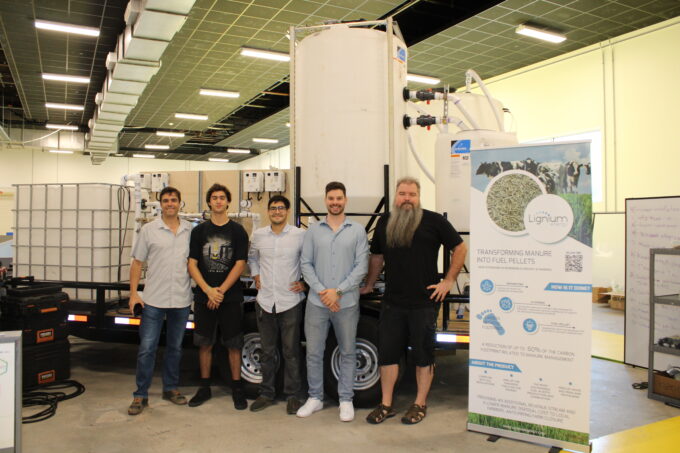Today, cow manure is a major climate and logistical problem on farms. Piles of decomposing cow manure emit methane and nitrous oxide, in addition to polluting water and contaminating soil. While some manure can serve as fertilizer, large farms still have an excess, and even have to pay to manage their extraneous manure.
Lignium Energy, a Greentown member, transforms that problematic manure into odorless combustion pellets that can be used as inexpensive, climate-friendly fuel and provide a new source of revenue to farmers.
The startup plans to sell its pellets to energy power plants. While the demand is primarily in Europe and Asia currently, Lignium Energy’s team says that the United States is expected to meaningfully shift from relying on coal to utilizing biomass.
“We solve part of an environmental problem, while creating an excellent business for itself,” says Lignium Energy’s CEO and Co-founder Enrique Guzmán.
Burning biomass for energy is not new, and traditionally has its problems, but Lignium Energy’s unique, cost-competitive technology employs a simple technique that doesn’t involve hard chemicals and needs little electricity. Lignium Energy says its technology can reduce a farm’s manure emissions by up to 68 percent. Its pellets are also a strong alternative to wood pellets, which are often used for biomass energy and contribute to deforestation.
Lignium Energy was founded in Santiago, Chile, four years ago in an effort to curb the country’s high pollution levels. Through the construction of a prototype in a dairy farm, the startup was able to successfully validate its process, product, and environmental impact and generate sales of its product.
“Our Co-founder José Antonio Caraball had a mission to reduce pollution in Chilean cities,” says Agustín Ríos, the startup’s COO. “Many of the most-polluted cities of South America are in Chile, and this is mainly because of the use of wood during the winter. So we needed to find a way to generate a fuel that was cheap, efficient, and environmentally friendly. At the same moment, the raw material that is abundant in Chile is manure, because there are many cows.”
The startup raised its pre-seed and ran a successful pilot in Chile, and moved to Houston in January 2022. Last year, the team built a demonstration plant in Greentown Houston’s prototyping and outdoor labs, which led to it receiving its U.S. product certifications.
“When we decided to move operations to the U.S., we didn’t have anything here,” Ríos said. “We were selected for more than one incubator, but we decided to go with Greentown Houston. All the help Greentown Labs has given us, from the beginning, has been amazing. All the networking that we’ve done through Greentown was very, very helpful, and was one of the reasons we decided to move everything to the U.S.”
In 2023, the 10-person startup intends to grow its team, raise its seed round, implement its innovation at a farm in the United States, and explore additional applications for its technology.


